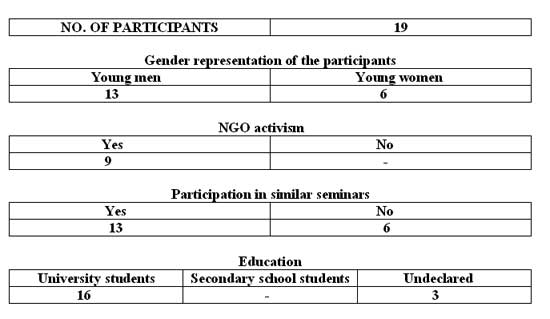HOW IS THE READINESS FOR
CONFLICT "PRODUCED?"
The first in the series of seminars planned under the project
"Capacitating Future Decision Makers: a Follow-up Program"
Novi Sad, November 28-30, 2007.
"This is the first time I attend a seminar as such and my
experience of it is phenomenal. I've make new friends and realized there are young people
who share my views. The seminar was well organized and I am very glad I've come to Novi
Sad to partake in it," The others too confirmed this impression voiced by a
participant from Ruma. At the final evaluation meeting they mostly underlined "good
vibrations," topics and keynote speakers - Borka Pavicevic and Filip David in
particular - and the opportunity to openly discuss no matter what.
Participation in the seminar upgraded their knowledge and clarified some
problems, they said. "When you said the seminar would deal with facing up the past I
thought it would be all about the tribunal in The Hague. The Hague Tribunal is just a
consequence of a wrong policy. However, hardly anyone speaks of what brought about such
policy and the extent to which culture and the people shaping it had contributed to it. I
welcome the efforts to critically reexamine the role of our culture-makers in the
production of nationalism. I would gladly join the Helsinki Committee's forthcoming
seminars," said a young woman.
The young trainees were especially captured by the Mental Disability
Rights International's /MDRI/ report "Torture not Treatment" on the situation in
Serbian psychiatric institutions that had raised hue and cry among domestic political
elite. Moreover, they supported some of the quotes with the cases familiar to them.
The seminar was addressed by outstanding public figures such as Borka
Pavicevic, director of the Center for Cultural Decontamination, Filip David, a founder of
the Writers' Forum, and Ivan Colovic, a founder of the "20th Century Library."
Each of them, from his or her angle - theater, national symbols and literature - broached
the "production" of the readiness for conflict.
Cooperation with the Center for the New Media "Kuda.org" added
to the seminar's success. A representative of the Center presented the participants their
project titled "Mapping the Rightist Extremism."
Most participants were of the opinion that such seminars should be
organized in other towns as well, in the province particularly. One of them said his NGO
would gladly provide all necessary organizational arrangements. Further, the participants
agreed that the issue of facing the past should be continually insisted on so as to reveal
the influence of other subsystem on the generation and spreading of populism and
nationalism. "War crimes as dark side of our history should become a part of our
national identity - for that's a way to curb them in the future or, at least, reduce to
minimum," said a participant.
Radio 021 and TV Novi Sad Romany Desk manifested interest in the
project. The Gradjanski List daily ran information about it - though an incomplete one. A
reporter for the Magyar Szo daily attended the first day of the seminar.
Twenty young people confirmed their participation in the seminar.
However, 19 actually attended it since one participant had to cancel his presence at the
eleventh hour.
The project is implemented with the assistance of the Balkan Trust for
Democracy.

|
